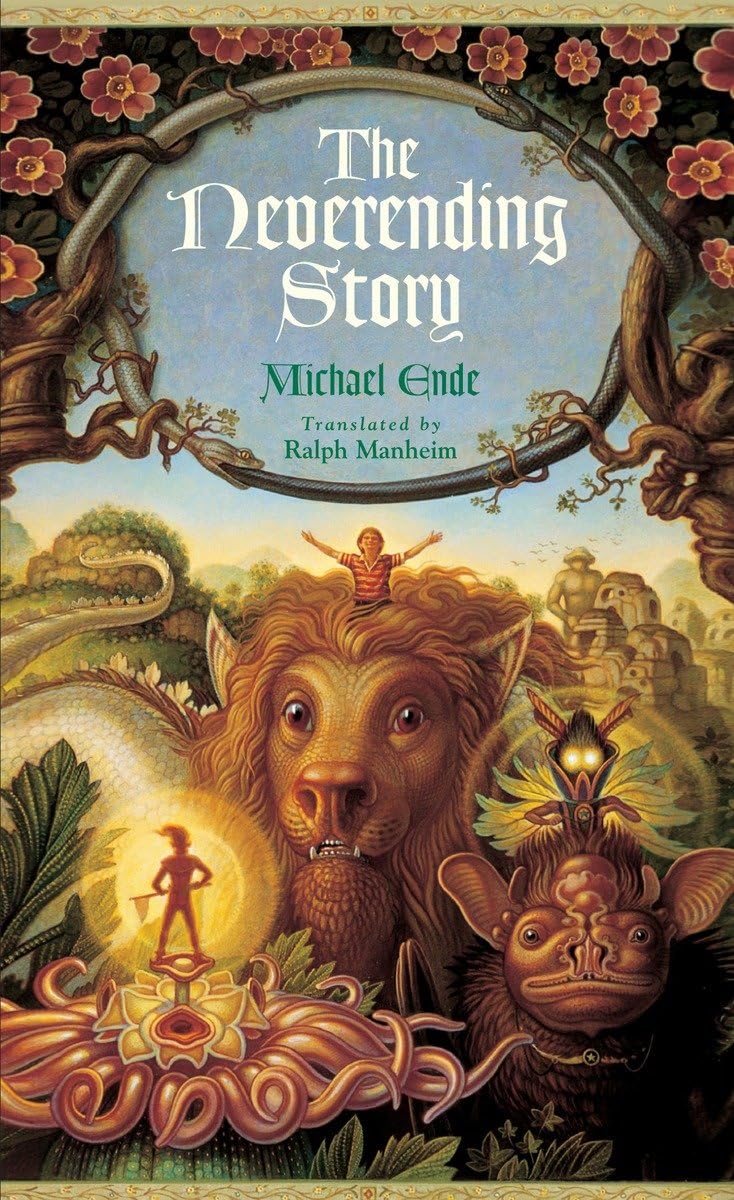Children of the eighties and nineties may remember the film The Neverending Story with a combination of wonder and dread, but the novel upon which that cult classic was loosely based is far more wonderful and strange than its Hollywood counterpart. Michael Ende’s novel is a true masterpiece, a highly readable and engrossing story that I’ve devoured three times since discovering it as an adult. Like the original film, but to a much greater degree, it is a story-teller’s story about the wonders, the dangers, and the mysteries of the human imagination.
While running from his problems, a pudgy and unremarkable middle-schooler by the name of Bastian Balthazar Bux takes refuge in an old bookstore. There he finds and, under some strange compulsion, steals an old volume called The Neverending Story. He escapes with the book into the creepy attic of his own school. Within that musty upper room, while a storm rages outside, Bastian discovers a world whose fascinating creatures and shifting geography prove as beautiful, dark, compelling, and fickle as his own heart’s desires. Between the aged covers he meets the Childlike Empress and the hero Atreyu, and learns of the desperate battle to save Fantastica from the Nothing. Strangest of all, Bastian soon realizes that the drama unfolding before him requires the intervention of one more protagonist, namely, himself. But can he accept the evidence that this is so before the Nothing swallows up Fantastica?
The plot of the original film corresponds to approximately the first half of the Ende’s book, and those who’ve seen it know that Bastian eventually does enter Fantastica to defeat the Nothing by giving the Childlike Empress a new name. However, not only does the film cut many rich elements from the first half, but it drops the second, and arguably main part of the story. Bastian saves the world, but the mere acquisition of new powers does not make him a true hero. In the book, Bastian’s Adam-like ability to sub-create within the realm of Fantastica has the potential to either destroy him through false wishes or else save him through the discovery of his deepest and most authentic wish.
For a work of middle-grade literature, The Neverending Story is quite deep, and it merits many re-readings. Unlike the film, in which the gifts of power and position transform the victimized protagonist into a hero, the book gives us a flawed character who needs to be saved as much as, if not more than, the world he (almost reluctantly) rescues. In the film, Bastian, a sensitive and misunderstood child, becomes important, saves the day, and even gets revenge upon his bullies. In the book, Bastian’s character flaws—which partly account for his “victimization” back in the real world—don’t disappear simply by a change in the balance of power. And unless he faces those flaws, those illusions about who he really is and what his heart truly desires, he is doomed not only to lose himself, but to contribute to destructive forces in the real world. The film’s Hollywood-style ending offers the typical Americanized idea of salvation through self-actualization. In contrast, the novel’s layered conclusion has Bastian undergoing a kind of baptism, losing himself entirely in order to gain the capacity to receive and to give authentic love through the “Waters of Life.” This image beautifully parallels the infusion of sanctifying grace through baptism, which both gives and enables charity.
No one can read The Neverending Story without being left thoughtful, pondering the book’s mysteries. Who is the Childlike Empress? What does she represent? Why must she be given, periodically, a new name? Why is she both very good, and yet tolerant of creatures of both light and darkness within Fantastica? How do those dark creatures differ from the true evils that threaten both Fantastica and the world of man, namely, the Nothing and the creature Gmork? Is Gmork an actual demon, sent to help guarantee the corruption of the human imagination? Why do creatures of Fantastica become lies if permitted to enter the Outer World? What is the nature of the mysterious link between Bastian and Atreyu? Is Ende’s “Fantastica” another name for Tolkien’s concept of “Faerie”? Why does it seem that stories and characters have lives of their own, and how does this dynamic connect to the human capacity for naming and sub-creating? Why does Bastian’s membership in the race of man, “Born of the Word” with the “gift of giving names” (pg. 97), give him the power to save Fantastica from real evil? Why must the Childlike Empress never meet the Old Man of Wandering Mountain? What are wishes, really, and how do a human heart’s true desires differ from its mere whims and infatuations? How is it that the latter can actually obscure and threaten the former?
I have my own answers to some of these questions, but I invite readers to engage with this fascinating novel if only to discover, with Bastian and me, that The Neverending Story possesses enough depth to be a different book upon every reading. The fact is that this strange novel is one of the most wonderful things I’ve read, though it’s hard to put a finger on just what makes it so compelling. Perhaps, like Bastian, I feel captured by its mysteries, which cry out to be explored, while offering only the sparest clues. Indeed, I expect someday—if it has not already happened—to find myself, like Bastian, pleasantly trapped within the pages of The Neverending Story. But that would be another story, to be told another time.



